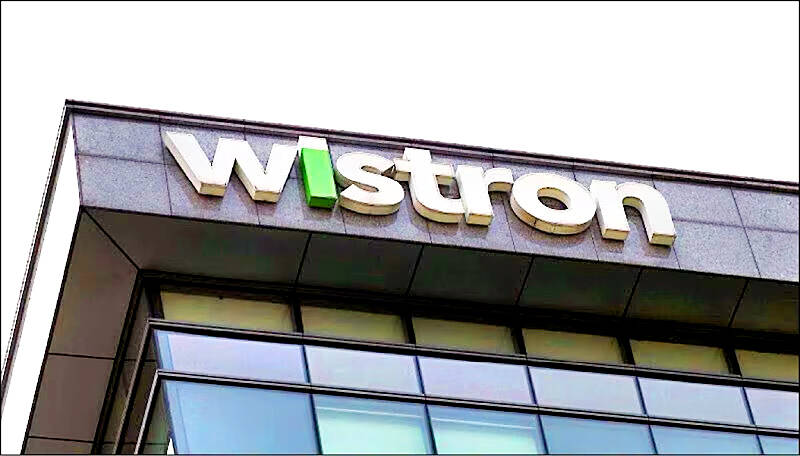Wistron Corp (緯創), a major graphics processing unit (GPU) server module supplier of Nvidia Inc, yesterday reported a significant improvement in its quarterly net profit for last quarter, thanks to a massive foreign exchange gains and an increase in the value of its stake in Luxshare Precision Industry Co (立訊精密).
Net profit soared to NT$3.26 billion during the second quarter, compared with NT$174 million in the first quarter. On an annual basis, net profit contracted 23.3 percent from NT$4.2 billion in the second quarter last year.
Earnings per share jumped to NT$1.16 last quarter from NT$0.06 in the first quarter, but decline from NT$1.53 last year.

Photo: Taipei Times
Wistron attributed the sequential growth to its non-operating income, including foreign exchange gains of NT$1.52 billion and a revaluation of its stake in Luxshare that added NT$535 million, Apple Inc’s Chinese supplier of iPhones.
During the first quarter, the company registered a foreign exchange loss of NT$316 million and a Luxshare revaluation loss of NT$361 million.
Wistron expects to book a final revaluation loss of NT$425 million during the current quarter, after divesting from the Chinese electronics maker entirely last month.
During the first two quarters of this year, Wistron posted net profit of NT$3.43 billion, up 1.2 percent from NT$3.39 billion in the same period last year.
Earnings per share rose slightly to NT$1.23 from NT$1.22.
Gross margin improved to 7.28 percent in the first two quarters of this year, from 6.2 percent a year earlier.
Wistron in March projected a lukewarm revenue outlook for this year, expecting revenue to be flat or up slightly from NT$984.4 billion last year due to weak demand for PCs.
Notebook and desktop computers contributed less than 50 percent of the company’s revenue in the first quarter.
Wistron also makes GPU servers and GPU accelerator cards, which together accounted for about 1.5 percent of its total revenue in the first quarter.
The company’s board of directors yesterday also approved a proposal to invest US$24.5 million to create a new subsidiary in Vietnam, Wistron Technology (Vietnam) Co Ltd, to cope with the company’s business expansion and its strategic planning.
The board also gave the go-ahead to a plan to sell 11.83 million common shares of Alpha Networks Inc (明泰科技). Following that transaction, Wistron would no longer hold a stake in Alpha Networks.
Since the beginning of this year, Wistron shares have skyrocketed from NT$29.2 to close at NT$114 yesterday, thanks to an artificial intelligence boom.

When an apartment comes up for rent in Germany’s big cities, hundreds of prospective tenants often queue down the street to view it, but the acute shortage of affordable housing is getting scant attention ahead of today’s snap general election. “Housing is one of the main problems for people, but nobody talks about it, nobody takes it seriously,” said Andreas Ibel, president of Build Europe, an association representing housing developers. Migration and the sluggish economy top the list of voters’ concerns, but analysts say housing policy fails to break through as returns on investment take time to register, making the

‘SILVER LINING’: Although the news caused TSMC to fall on the local market, an analyst said that as tariffs are not set to go into effect until April, there is still time for negotiations US President Donald Trump on Tuesday said that he would likely impose tariffs on semiconductor, automobile and pharmaceutical imports of about 25 percent, with an announcement coming as soon as April 2 in a move that would represent a dramatic widening of the US leader’s trade war. “I probably will tell you that on April 2, but it’ll be in the neighborhood of 25 percent,” Trump told reporters at his Mar-a-Lago club when asked about his plan for auto tariffs. Asked about similar levies on pharmaceutical drugs and semiconductors, the president said that “it’ll be 25 percent and higher, and it’ll

CHIP BOOM: Revenue for the semiconductor industry is set to reach US$1 trillion by 2032, opening up opportunities for the chip pacakging and testing company, it said ASE Technology Holding Co (日月光投控), the world’s largest provider of outsourced semiconductor assembly and test (OSAT) services, yesterday launched a new advanced manufacturing facility in Penang, Malaysia, aiming to meet growing demand for emerging technologies such as generative artificial intelligence (AI) applications. The US$300 million facility is a critical step in expanding ASE’s global footprint, offering an alternative for customers from the US, Europe, Japan, South Korea and China to assemble and test chips outside of Taiwan amid efforts to diversify supply chains. The plant, the company’s fifth in Malaysia, is part of a strategic expansion plan that would more than triple

Taiwanese artificial intelligence (AI) server makers are expected to make major investments in Texas in May after US President Donald Trump’s first 100 days in office and amid his rising tariff threats, Taiwan Electrical and Electronic Manufacturers’ Association (TEEMA, 台灣電子電機公會) chairman Richard Lee (李詩欽) said yesterday. The association led a delegation of seven AI server manufacturers to Washington, as well as the US states of California, Texas and New Mexico, to discuss land and tax issues, as Taiwanese firms speed up their production plans in the US with many of them seeing Texas as their top option for investment, Lee said. The